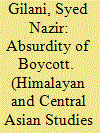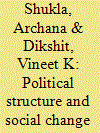| Srl | Item |
| 1 |
ID:
091135


|
|
|
|
|
| Publication |
2009.
|
| Summary/Abstract |
On the eve of elections in Srinagar, three important statements have been made and these need an examination in public interest: "we appeal the people of Srinagar to remain away from the election drama as a gratitude to the lakhs of Kashmiris who sacrified their lives for resolution of Kashmir dispute according to their aspirations."
|
|
|
|
|
|
|
|
|
|
|
|
|
|
|
|
| 2 |
ID:
091141


|
|
|
|
|
| Publication |
2009.
|
| Summary/Abstract |
The monasteries in Ladakh and other Gonpas in the Himalayas are filled with statues and painting-scrolls of six ornaments of Jambhudipa. The philosophy of India Acharyas has formed the core of syllabi in these monasteries.
|
|
|
|
|
|
|
|
|
|
|
|
|
|
|
|
| 3 |
ID:
091148


|
|
|
|
|
| Publication |
2009.
|
| Summary/Abstract |
As regards India's policy towards Tibet, the evolution of India's Tibet policy can be traced back to its pre-independence period. Between 1947 and 1954, India's Tibet policy moved around recognising Tibet as an independent nation. And Tibet did participate as an independent country at the first Asian relations conference held in New Delhi in March-April 1947, just a few months before India gained its formal independence.
|
|
|
|
|
|
|
|
|
|
|
|
|
|
|
|
| 4 |
ID:
091138


|
|
|
|
|
| Publication |
2009.
|
| Summary/Abstract |
The study of Indo-Tibetan relations is of great interest for social scientists specialising in traditional societies, in that it demonstrates how the universals of world religions, i.e. Budhismm, interact with cultural specificity, producing a unique culture and unique civilisation.
|
|
|
|
|
|
|
|
|
|
|
|
|
|
|
|
| 5 |
ID:
091136


|
|
|
|
|
| Publication |
2009.
|
| Summary/Abstract |
The elections in the Indian State of Jammu and Kashmir finished with astonishing outcomes. However, some sections of Pakistani media and those who support Pakistan irrespective of what they have done to the Kashmir issue, harp on the theme of boycott of elections and alleged excesses by the Indian Army.
|
|
|
|
|
|
|
|
|
|
|
|
|
|
|
|
| 6 |
ID:
091134


|
|
|
|
|
| Publication |
2009.
|
| Summary/Abstract |
In Jammu and Kashmir State, Legislative Assembly elections are held every six years unlike other Indian States where these elections take place every five years. The last elections in J&K State were held in September/October 2002. Consequently, elections were due in September/October 2008.
|
|
|
|
|
|
|
|
|
|
|
|
|
|
|
|
| 7 |
ID:
091146


|
|
|
|
|
| Publication |
2009.
|
| Summary/Abstract |
The central and most distinguishing feature of the traditional Tibetan policy was the theocratic nature of the government. Another unique feature of the Tibetan government was its dualistic structure of administrate bosses were two in number- one monk and other, a lay official.
|
|
|
|
|
|
|
|
|
|
|
|
|
|
|
|
| 8 |
ID:
091145


|
|
|
|
|
| Publication |
2009.
|
| Summary/Abstract |
This paper focuses on the changes in administrative management of the Tibetan monasteries, besides analyzing the nature of the new internal structure and management of its operations.
|
|
|
|
|
|
|
|
|
|
|
|
|
|
|
|
| 9 |
ID:
091139


|
|
|
|
|
| Publication |
2009.
|
| Summary/Abstract |
Religion plays a major role in the development of culture and society in Tibet. For Tibetans, when they were in Tibet, everything began and ended with religion. All religious acts were social acts and all social acts were religious acts. In fact, acts were more important that the people who performed them.
|
|
|
|
|
|
|
|
|
|
|
|
|
|
|
|
| 10 |
ID:
091147


|
|
|
|
|
| Publication |
2009.
|
| Summary/Abstract |
According to the recorded history, direct contact between India and Tibet took place only in the 7th century AD during the reign of 33rd king Srong btsen sGampo who was popularly known by the title of chos-rgyal (Dharmaraja) as the worlds chos and rgyal denoted the depth of Tibetan ethos and sanctified the king as a political authority.
|
|
|
|
|
|
|
|
|
|
|
|
|
|
|
|